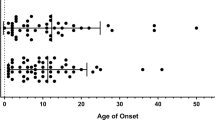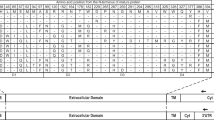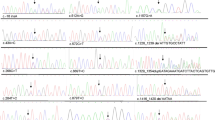Abstract
Polymorphic variants p.66L>R/H (g.7081T>G/A; rs10127939) and p.176F>V (g.10872T>G; rs396991) in FCGR3A (CD16A) have been associated with defects in cytotoxic function of natural killer (NK) cells in humans. Genotyping of these variants in genomic DNA has been ambiguous because of high degree of homology between FCGR3A and FCGR3B. We designed a strategy to genotype these polymorphisms and to evaluate their effects on NK cells' cytotoxic activity. One hundred and fifteen individuals from different geographical regions of Colombia were included. Specific primers were designed to amplify FCGR3A exons 4 and 5 encompassing g.7081T>G/A and g.10872T>G by long-range and nested polymerase chain reaction and sequencing. The binding of different monoclonal antibodies to CD16A and NK antibody-dependent cellular cytotoxicity (ADCC) were evaluated. We demonstrate that amplifying and sequencing FCGR3A allows genotyping of g.7081T>G/A and g.10872T>G without interference from FCGR3B. Allele frequencies in our population were as follows: 7081T = 0.895, 7081G = 0.065, 7081 A = 0.039, 10872T = 0.673, and 10872G = 0.326. We also observed linkage disequilibrium between variants 7081T and 10872G. Interestingly, 176FF variant affected the reactivity of MEM154 monoclonal antibody against CD16A, but it did not affect ADCC. Our studies aimed to determine whether clinical association exists between these polymorphisms and NK cell function defects in patients with compatible phenotypes.
This is a preview of subscription content, access via your institution
Access options
Subscribe to this journal
Receive 6 digital issues and online access to articles
$119.00 per year
only $19.83 per issue
Buy this article
- Purchase on Springer Link
- Instant access to full article PDF
Prices may be subject to local taxes which are calculated during checkout


Similar content being viewed by others
References
Fridman WH. Fc receptors and immunoglobulin binding factors. FASEB J. 1991;5(12):2684–90.
Lehrnbecher T, Foster CB, Zhu S, Leitman SF, Goldin LR, Huppi K, et al. Variant genotypes of the low-affinity Fcgamma receptors in two control populations and a review of low-affinity Fcgamma receptor polymorphisms in control and disease populations. Blood. 1999;94(12):4220–32.
Vivier E, Nunès JA, Vély F. Natural killer cell signaling pathways. Science. 2004;306(5701):1517–9.
Lanier LL. NK cell recognition. Annu Rev Immunol. 2005;23:225–74.
Grier JT, Forbes LR, Monaco-Shawver L, Oshinsky J, Atkinson TP, Moody C, et al. Human immunodeficiency-causing mutation defines CD16 in spontaneous NK cell cytotoxicity. J Clin Invest. 2012;122(10):3769–80.
De Haas M, Koene HR, Kleijer M, de Vries E, Simsek S, van Tol MJ, et al. A triallelic Fc gamma receptor type IIIA polymorphism influences the binding of human IgG by NK cellFc gamma RIIIa. J Immunol. 1996;156(8):2948–55.
De Vries E, Koene HR, Vossen JM, Gratama JW, von dem Borne AE, Waaijer JL, et al. Identification of an unusual Fc gamma receptor IIIa (CD16) on natural killer cells in a patient with recurrent infections. Blood. 1996;88(8):3022–7.
Lenart M, Trzyna E, Rutkowska M, Bukowska-Strakova K, Szaflarska A, Pituch-Noworolska A, et al. The loss of the CD16 B73.1/Leu11c epitope occurring in some primary immunodeficiency diseases is not associates with the FcgammaRIIIa-48L/R/H polymorphism. Int J Mol Med. 2010;26(3):435–42.
Dall’Ozzo S, Andres C, Bardos P, Watier H, Thibault G. Rapid single-step FCGR3A genotyping based on SYBR Green I fluorescence in real-time multiplex allele-specific PCR. J Immunol Methods. 2003;277(1-2):185–92.
Wu J, Edberg JC, Redecha PB, Bansal V, Guyre PM, Coleman K, et al. A novel polymorphism of FcgammaRIIIa (CD16) alters receptor function and predisposes to autoimmune disease. J Clin Invest. 1997;100(5):1059–70.
Jawahar S, Moody C, Chan M, Finberg R, Geha R, Chatila T. Natural Killer (NK) cell deficiency associated with an epitope-deficient Fc receptor type IIIA (CD16-II). Clin Exp Immunol. 1996;103(3):408–13.
Koene HR, Kleijer M, Algra J, Roos D, von dem Borne AE, de Haas M. Fc gammaRIIIa-158V/F polymorphism influences the binding of IgG by natural killer cell FcgammaRIIIa, independently of theFc gammaRIIIa-48L/R/H phenotype. Blood. 1997;90(3):1109–14.
Koene HR, Kleijer M, Swaak AJ, Sullivan KE, Bijl M, Petri MA, et al. The Fc gammaRIIIA-158F allele is a risk factor for systemic lupus erythematosus. Arthritis Rheum. 1998;41(10):1813–8.
Cartron G, Dacheux L, Salles G, Solal-Celigny P, Bardos P, Colombat P, et al. Therapeutic activity of humanized anti-CD20 monoclonal antibody and polymorphism in IgG Fc receptor FcgRIIIa gene. Blood. 2002;99:754–8.
Oh M, Petri MA, Kim NA, Sullivan KE. Frequency of the Fc gamma RIIIA158F allele in African American patientswith systemic lupus erythematosus. J Rheumatol. 1999;26(7):1486–9.
Leppers-van de Straat FG, van der Pol WL, Jansen MD, Sugita N, Yoshie H, Kobayashi T, et al. A novel PCR based method for direct Fc gamma receptor IIIa (CD16) allotyping. J Immunol Methods. 2000;242(1-2):127–32.
Sánchez IP, Leal-Esteban LC, Orrego-Arango JC, Garcés-Samudio CG, Gómez-Arias RD, Franco JL, et al. Variation in NK cell number and function in individuals with recurrent or severe infections. Biomedica. 2014;34(1):118–31.
Bowles JA, Weiner GJ. CD16 polymorphisms and NK activation induced by monoclonal antibody-coated target cells. J Immunol Methods. 2005;304(1-2):88–99.
Osborne JM, Chacko GW, Brandt JT, Anderson CL. Ethnic variation in frequency of an allelic polymorphism of human Fc gamma RIIA determined with allele specific oligonucleotide probes. J Immunol Methods. 1994;173(2):207–17.
Botto M, Theodoridis E, Thompson EM, Beynon HLC, Briggs D, Isenberg DA, et al. FcgRIIa polymorphism in systemic lupus erythematosus (SLE): no association with disease. Clin Exp Immunol. 1996;104(2):264–8.
Kobayashi T, Westerdaal NAC, Miyazaki A, van der Pol WL, Suzuki T, Yoshie H, et al. Relevance of immunoglobulin G Fc receptor polymorphism to recurrence of adult periodontitis in Japanese patients. Infect Immun. 1997;65(9):3556–60.
Rascu A, Repp R, Westerdaal NAC, Kalden JR, van de Winkel JGJ. Clinical relevance of FcgR polymorphisms. Ann N Y Acad Sci. 1997;815:282–95.
Salmon JE, Ng S, Yoo DH, Kim TH, Kim SY, Song GG. Altered distribution of Fcg receptor IIIA alleles in a cohort of Korean patients with lupus nephritis. Arthritis Rheum. 1999;42(4):818–9.
Sugita N, Yamamoto K, Kobayashi T, Van der Pol WL, Horigome T, Yoshie H, et al. Relevance of FcgRIIIa-158V-F polymorphism to recurrence of adult periodontitis in Japanese patients. Clin Exp Immunol. 1999;117(2):350–4.
Weng WK, Levy R. Two immunoglobulin G fragment C receptor polymorphisms independently predict response to rituximab in patients with follicular lymphoma. J Clin Oncol. 2003;21:3940–7.
Treon SP, Hansen M, Branagan AR, Verselis S, Emmanouilides C, Kimby E, et al. Polymorphisms in FcgRIIIA (CD16) receptor expression are associated with clinical response to rituximab in Waldenström’s macroglobulinemia. J Clin Oncol. 2005;23:474–81.
Anolik JH, Campbell D, Felgar RE, Young F, Sanz I, Rosenblatt J, et al. The relationship of FcgRIIIa genotype to degree of B cell depletion by rituximab in the treatment of systemic lupus erythematosus. Arthritis Rheum. 2003;48:455–9.
Acknowledgments
This study was supported by the Colombian Institute for the Development of Science and Technology, COLCIENCIAS (Grant #111556934426).
Author information
Authors and Affiliations
Corresponding author
Ethics declarations
Conflict of interest
The authors declare no competing interests.
Additional information
Publisher’s note
Springer Nature remains neutral with regard to jurisdictional claims in published maps and institutional affiliations.
Rights and permissions
About this article
Cite this article
Pérez-Romero, C.A., Sánchez, I.P., Naranjo-Piedrahita, L. et al. Frequency analysis of the g.7081T>G/A and g.10872T>G polymorphisms in the FCGR3A gene (CD16A) using nested PCR and their functional specific effects. Genes Immun 20, 39–45 (2019). https://doi.org/10.1038/s41435-017-0001-0
Received:
Revised:
Accepted:
Published:
Issue Date:
DOI: https://doi.org/10.1038/s41435-017-0001-0



